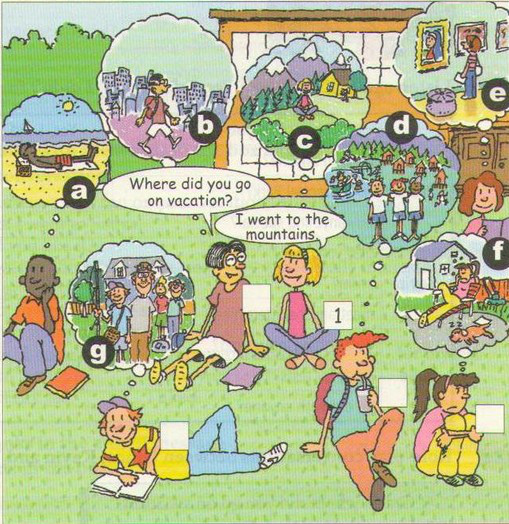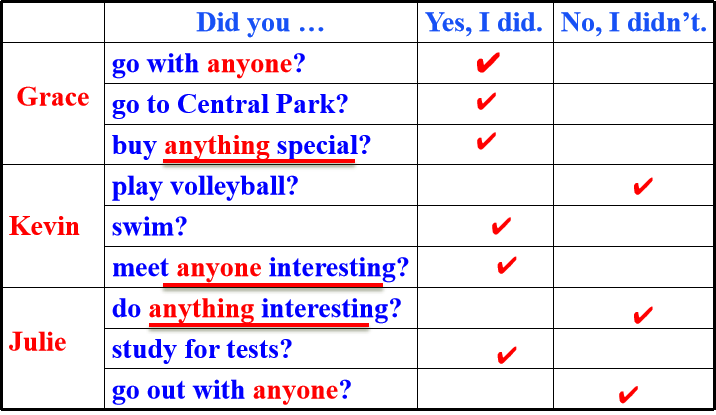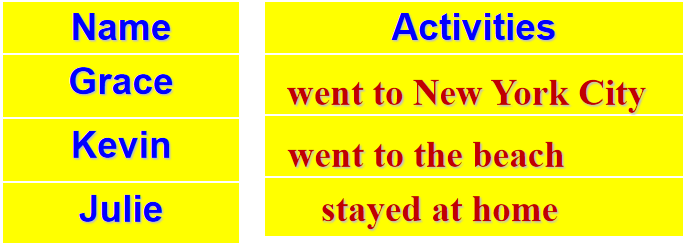1.复合不定代词(anyone,anything, something,everything,nothing)含义及用法。
2.一般过去式的规则动词与不规则动词。
能力目标:Learn to talk about past events using the simple past tense.
情感目标:Talk about own vacation experience and enjoy the life.
Words review
anyone:pron. 任何人
anywhere:adv. 在任何地方
wonderful:adj. 精彩的;绝妙的
few:adj. & pron. 不多;很少
quite a few:相当多;不少
most:adj., adv. & pron. 最多;大多数
Where did you go on your vacation?
Where did they go on vacation?
went to the mountains
Where did Lucy go on vacation?
went to New York City
Where did Sally go on vacation?
went to the beach
Where did they go on vacation?
went to summer camp
Where did Tom go on vacation?
visited museums
Where did Xiao Hong go on vacation?
stayed at home
Where did Xiao Ming go on vacation?
visited his uncle
1a.Match the pictures with the activities [a-g].
1. stayed at home __
2. went to New York City __
3. visited my uncle __
4. went to summer camp __
5. went to the mountains __
6. went to the beach __
7. visited museums ___

1b Listen and number the people in the picture [1-5].
1. Tina
2. Xiang Hua
3. Sally
4. Bob
5. Tom
1c Pairwork Make conversations about the people in 1a.
:Where did Tina go on vacation?
:She went to the mountains.
:Where did Xiang Hua go on vacation?
:She went to New York City.
:Where did Sally go on vacation?
:She stayed at home.
:Where did Tom go on vacation?
:He went to summer camp.
Where did you go on vacation?
Did you go with anyone?
Did you meet anyone interesting?
Did you eat anything delicious?
Let's interview another three students.
Listen and answer the questions.
2a Listen. Where did the people go on vacation? Complete the chart.
| People | Places |
| Grace | New York City |
| Kevin | the beach |
| Julie | stayed at home |
2b Listen again. Check (✔) Yes, I did or No, I didn’t for each question.

2c Role-play the conversations between Grace, Kevin and Julie.
A: Grace, where did you go on vacation?
B: I went to New York City.
A: Oh, really? Did you go with anyone?
B: Yes, I went with my mother.
Make a report according to 2b and the following information.

Report like this:
On vacation, Grace went to New York City. She went with her mother. She thought Center Park was really nice. She bought a hat for her father. ...
Language Points
1. --Where did you go on vacation?
你去哪儿度假了?
--I went to the mountains.
我去了山区爬山。
1) 这是一个特殊疑问句。由“特殊疑问词+助动词+主语+动词+其它?” 构成。
由于是询问已发生的动作(过去的事情),所以助动词用过去式did, 其后的动词用原形。
e.g. --Where did you go yesterday?
你昨天去了哪儿?
--I visited my friends.
我去拜访了朋友。
2) 与go to the mountains结构类似的词组还有:
go to the beach 去海边
go to summer camp 去夏令营
go to New York City 去纽约市
go on vacation 去度假
go to a trip 去旅行
go to the movies 去看电影
2. -- Did you go to Central Park?
你去中心公园了吗?
-- Yes, I did.
是的, 去了。
这是一个一般疑问句, 由助动词提问,回答也用助动词。由于询问的是发生在过去的事, 所以助动词用过去式did。
一般过去时的一般疑问句的句子结构:Did+主语+动词原形+其它+? 回答: Yes, 主+did. / No, 主+didn’t.
在过去时态中, 无论主语是第几人称, 是单数还是复数, 助动词一律用 did。
如: --Did you/he/she/they go to the park last night?
--Yes, I/he/she/they did.
3. I stayed at home. 我呆在家里。
1) stay可以作及物动词, 也可以作不及物动词。当它作不及物动词时就不能直接接宾语, 其后接相应的介词短语, 表地点(留在某地)或表状态(保持某种状态)。
4. Did you eat anything delicious?
在英语中,anything, something, nothing 和everything是用于指代事物的复合不定代词,与之相对应的复合不定代词 anyone, someone, no one 和everyone ( anybody, somebody, nobody 和 everybody) 用于指人与形容词连时, 形容词必须放在复合不定 代词之后,语法上称作“后置”。
例如: something important—— 重要的事
I can see someone new in your group. 我看出你们小组里有新人。
There’s nothing interesting in the news today. 今天的新闻里没有什么有趣的新闻。











